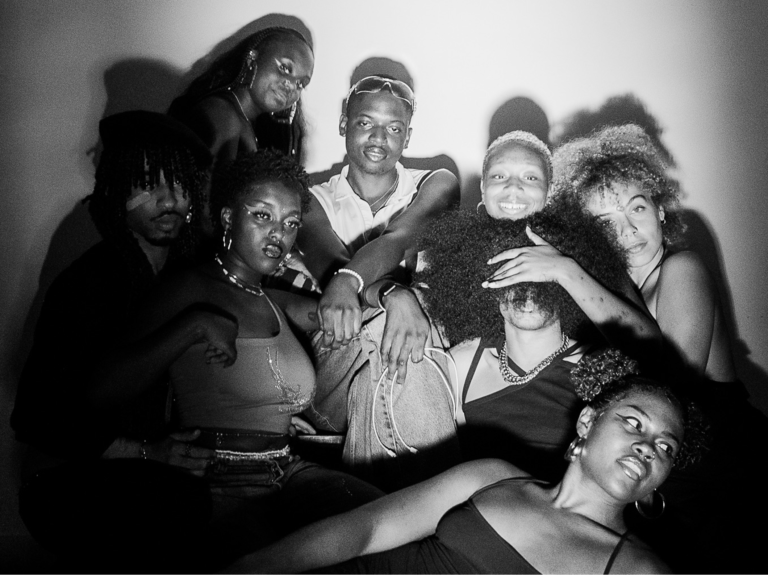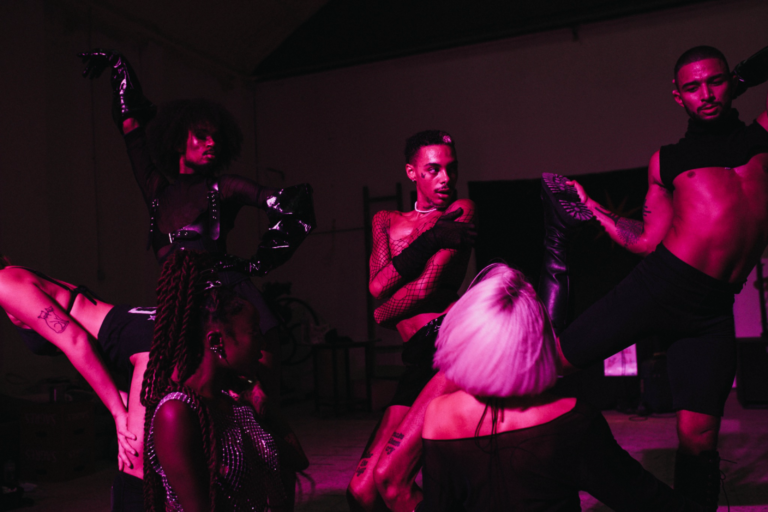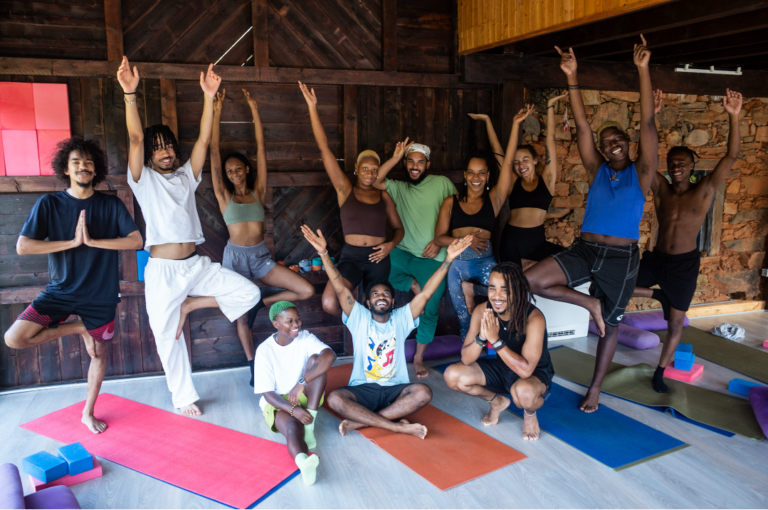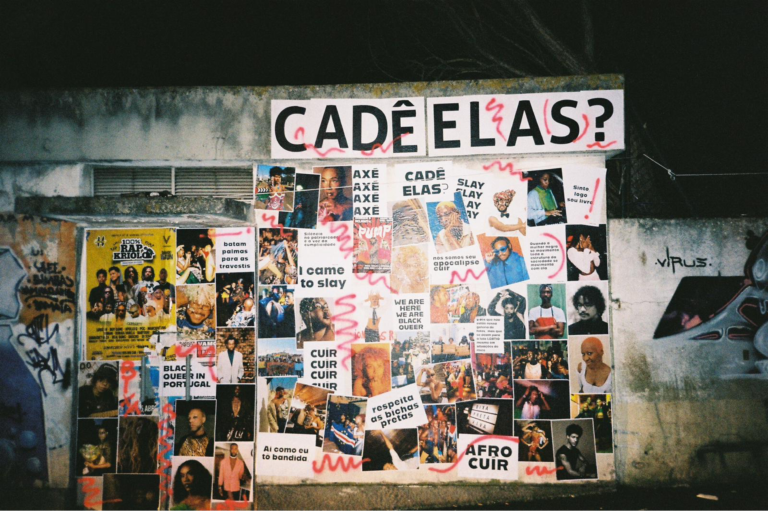Author: Jesualdo Lopes
While art can become a bridge and community a force for change, The Blacker The Berry Project redefines what it means to create spaces of resistance, belonging, and love. Born from the intersection of Blackness, queerness, and creativity, this independent multidisciplinary collective has journeyed from Leeds to Lisbon to London, reshaping cultural landscapes and amplifying marginalised voices along the way. Through art, and activism, TBTB stands as a proof of the power of collective vision, inviting us to reimagine the future by honouring the diverse stories of the past. As the collective celebrates its fourth anniversary on February 3rd, founder Jesualdo Lopes looks back on TBTB's journey and horizons.

The collective’s crew and community members at Galeria ZDB for ‘Sabura Zine Launch’ – © Rafael De Oliveira (@oxyretronave)
The blacker the berry, the sweeter the juice–people’s favourite sentence when discovering the multidisciplinary artistic collective, The Blacker The Berry Project, for the first time in the past four years. Four years ago, a movement was (re)born in Leeds, (re)shaped in Lisbon and transitioned to the majestic cultural hub, London. Leeds, with its academic environment and active multicultural community, was the birthplace where many first ideas gained form. Lisbon, brought the challenge of adapting these ideas to a reality deeply marked by colonial scars, urban segregation and lack of resources. London, one of the largest cultural centres in the world, offered a space to test and expand the collective's practices, connecting with a wider network of artists and activists. This constant exchange between geographies has not only shaped the collective's methodologies, but also strengthened the vision of a global movement rooted in local experiences.
The Context, The Roots
The Blacker The Berry Project emerges in 2021, at the height of the global Black Lives Matter movement, in response to the devaluation of non-monolithic experiences, histories and cultures within Black communities. For context, we will go back in time. We are in the summer of 2020, the COVID-19 pandemic is on the rise and the world is adapting to a new normal for an indefinite period of time, when we are told of a fatal death caused by another virus: racism. George Floyd, father, brother, son, and above all, citizen, is murdered at the hands of the American state; American state named Derek Chauvin, the fruit of white supremacy and an ideology of imperialist hatred promoted within and outside Western government organisations. The world, tired of the viruses that corrode us, takes it to the streets. No justice, no peace becomes this summer's motto–from the United States to the United Kingdom, from Japan to Thailand, and from Brazil to Portugal. Portugal, being the founding father of the transatlantic slavery movement, follows in the same footsteps as its children. On July 25th of the same year, Bruno Candé passes away. Father, brother, son, and above all, citizen, Candé is also murdered by the hands of the result of colonialism with the name of Evaristo Marinho, former combatant for Portugal in the Independence Wars of the PALOP (Portuguese-Speaking African Countries).
These consecutive and tragic events trigger in me, Jesualdo Lopes, son, brother, and above all, citizen, born and raised in Lisbon Metropolitan Area, and founder of the collective, making me question the intersection (or lack thereof) of two of my marginalised identities–Blackness and Queerness. Where do people like me belong in libertarian discourse? Where are we? How do we move? Where are we going? About four years ago, The Blacker The Berry Project answered these questions through community and art. Art, being one of the most accessible refuges in society, whether through TV, cinema, music, theatre or other formats, ends up serving as a political, self-help and/or communication tool for those who wish to express their opinions or to immortalise their communities through a medium that is not always tangible or objective. This possibility of infinite expansion makes us imagine a future, often called utopian, helping us to connect with not-so-distinct minds beyond physical borders. Hence the emergence of the collective.

A Path Between Leeds, Lisbon, and London
On the 3rd February 2021, in the British city of Leeds, TBTB was born. With the aim of amplifying, celebrating and platforming emerging Black and queer creatives residing not only in the Diaspora, but also in the motherland, the initiative also aimed at creating more decolonial, inclusive, intentional and safer spaces, promoting conversations about gender, sexuality and race from common to individual Black experiences. It all starts with an intimate exhibition at Wharf Chambers, a community bar in the heart of the city, where the protagonists are students from the Leeds Arts University, who for almost a year produced several projects behind closed doors that, until then, would never have seen the daylight or perspectives other than their creators; followed by the largest zine to date produced by the collective, introducing 22 African, Caribbean and South American artists, including poetry, illustration, graphic design and photography, serving as a tester for the boom that was to (re)shape Lisbon's cultural scene.
Having experienced the City of Seven Hills for over two decades, and particularly at the peak of its Black movement following Candé’s murder, these events and involvement in Black activism in a British context during my academic journey spiked the need to adapt it to the Portuguese context for seeing the power in a community that was not so visible, and consequently somewhat dispersed, due to the lack of targeted spaces and the infamous for us by us policies. Lisbon, as the former epicentre of the non-glorious Portuguese Empire, is a segregated city where racialised communities are placed on the limits of the district, often characterised as dormitory zones. On the Sintra Line, the area with the highest percentage of African and Afro-descent people in the Iberian Peninsula, on the South Bank of the Tagus River, in the municipalities of Odivelas, Loures or other locations with a high population density. This segregation impacts the benefits that these same communities could take from the city where they live and work, creating a separation between them and us, leading to difficult access to its advantages, as working-class artists or mere Portuguese citizens (on paper).
In August 2021, TBTB challenges its structure, originating the first-ever Safer and Intentional Spaces Policy in the country. No sexism, racism, ableism, transphobia, homophobia, misgendering becomes one of the main mottos of the end of summer, alongside a new tier system prioritising Black LGBTQIAP+ people with discounted and/or free admission, becoming a replicable model for organisations seeking to democratise access to culture. The implementation of these policies were a watershed, not only for the project, but also for the capital’s cultural scene. Prioritising the inclusion and safety of visitors, this policy was adopted by several cultural and event spaces in the city, promoting, from the outset, a structural change in the way marginalised communities are welcomed, mainly in the city centre.

‘The Blacker The Moses’ first cohort at Vale de Moses Yoga Retreat – © The Blacker The Berry Project
On the 12th September 2021, everything changes. A new generation of Black queer artists, creatives, makers and people (re)claims the city through art, through community, and above all, through love, because love wins indeed, as depicted in a short film produced with support from DGArtes for Rádio Quântica’s online festival, Quantum Leap. Hosted in the former Núcleo A70, back2black featured visual artists, independent businesses and organised sub-movements, such as the up-and-coming Lisbon’s ballroom scene, and the first-protected club night during COVID-19. back2black opened many doors and possibilities–new club nights emerged, underground movements became mainstream, and people saw a chance to bring their idealisations to life. A snowball took over the city, with the adaptation of inclusive policies by various nightclubs and art institutions from 2021 to the present day. From then on, an active exchange between Portugal and the United Kingdom begins, where each context and moment becomes a learning experience for the next step. Between events dedicated to Black women (Mindjeres di Mundo), the first creative and spiritual retreat exclusively dedicated to 10 artists from the Lisbon Metropolitan Area in partnership with the family-run Vale de Moses Yoga Retreat in Castelo Branco district (The Blacker The Moses), a series of regular club nights named (Nô Balur = ‘our value’ in Bissau-Guinean Creole), the launch of the third edition of the zine focusing on femme and non-binary artists from the PALOP communities (Sabura = ‘to enjoy’ in Bissau-Guinean and Cape Verdean Creoles) and a special partnership with a music festival (Iminente), 2022 ends up becoming the most important year for establishing the credibility of The Blacker The Berry Project. Additionally, this period of time formalises the collective as an engaging and interdisciplinary project that goes beyond night events, covering a larger audience, many of them with little access to this type of space, whether for physical or financial reasons.

Now Into the Next Steps
With all eyes on the project, 2023 and 2024 were years of reflection and planning. With its fourth anniversary on the horizon, preserving the essence of TBTB involves recognising that its structures may fail, mainly due to a lack of consistent external funding, but the community's strength lies in its ability to adapt and reinvent. The Queer Kizomba classes, launched in London back in 2023, have become a symbol of this resilience, connecting cultures and traditions with queer bodies through dance, with an innovative and fresh lens. Black Pride Matters, the first Black Pride-alike celebration ever organised in Portugal and in partnership with Afrontosas and Bazofo Dentu Zona collectives, respectively, marks a historical moment of celebration and resistance in what is the birthplace of Black culture in the country, Cova da Moura.
And in 2025, what should you expect? Among the initiatives already confirmed, the collaboration with the London-based Sierra Leonean artist, Julianknxx, at the CAM - Centro de Arte Moderna at the Calouste Gulbenkian Foundation, in Lisbon, stands out, where the public programme curated by Paulo Pascoal, Selma Uamusse, myself and another member of the collective, Rafael de Oliveira, will explore narratives of memory, diaspora and belonging.
Looking back, it's impossible not to recognise the collective strength that made TBTB a reality. But, more than a reflection of the past, this is an invitation to imagine the future in the present. How will we preserve our stories? How will we continue to create spaces where art and community intertwine? Who will be responsible for disseminating our achievements in the near future? What is the Black Pride ideal in our (collective) imagination?
Art is resistance and resistance is love–my favourite sentence that has accompanied the collective since the beginning.
Published on January 28th, 2025
About the author:
Jesualdo Lopes (he/him) is a Lisbon-born London-based multidisciplinary artist of Bissau-Guinean heritage whose journey has led him to become a versatile force in the realms of events, community activism, and film. In 2021, Jesualdo established The Blacker The Berry Project, a collective championing Black LGBTQ+ artists across the globe through creative intervention such as exhibitions, club nights, workshops, and residencies. Since then, the collective has made a significant impact through its policies, having pioneered The Blacker The Moses, an exclusive retreat for Black working class creatives in collaboration with the family-run yoga facility Vale de Moses in the Portuguese mountains, as well as the country’s first known Safer Spaces Policy and Black Pride this year. In addition to his work, Jesualdo is the Events and Outreach at the London LGBTQ+ Community Centre. His enthusiasm for creating safe, intergenerational, and intersectional spaces within the LGBTQ+ community is a testament to his ongoing commitment to making a difference and fostering inclusivity.